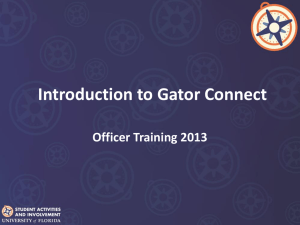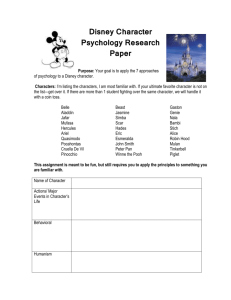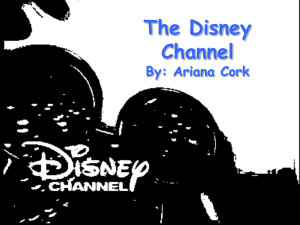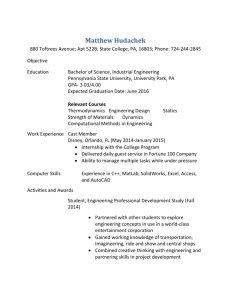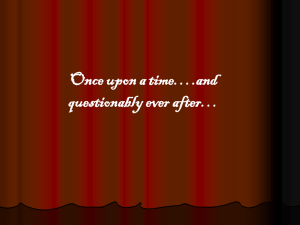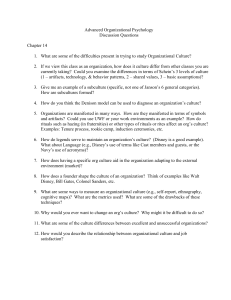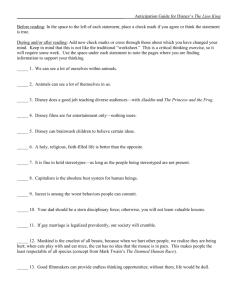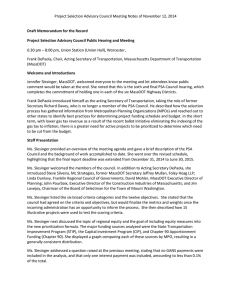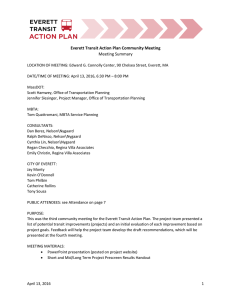Media Law - Sedgwick LLP
advertisement
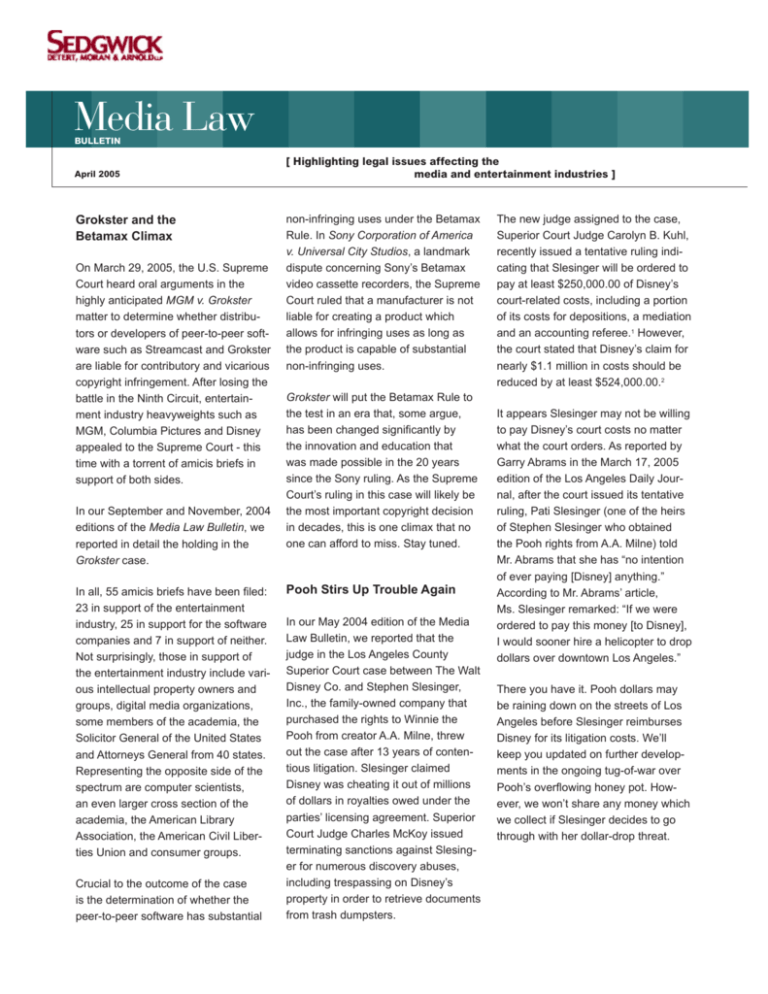
Media Law BULLETIN April 2005 Grokster and the Betamax Climax On March 29, 2005, the U.S. Supreme Court heard oral arguments in the highly anticipated MGM v. Grokster matter to determine whether distributors or developers of peer-to-peer software such as Streamcast and Grokster are liable for contributory and vicarious copyright infringement. After losing the battle in the Ninth Circuit, entertainment industry heavyweights such as MGM, Columbia Pictures and Disney appealed to the Supreme Court - this time with a torrent of amicis briefs in support of both sides. In our September and November, 2004 editions of the Media Law Bulletin, we reported in detail the holding in the Grokster case. In all, 55 amicis briefs have been filed: 23 in support of the entertainment industry, 25 in support for the software companies and 7 in support of neither. Not surprisingly, those in support of the entertainment industry include various intellectual property owners and groups, digital media organizations, some members of the academia, the Solicitor General of the United States and Attorneys General from 40 states. Representing the opposite side of the spectrum are computer scientists, an even larger cross section of the academia, the American Library Association, the American Civil Liberties Union and consumer groups. Crucial to the outcome of the case is the determination of whether the peer-to-peer software has substantial [ Highlighting legal issues affecting the media and entertainment industries ] non-infringing uses under the Betamax Rule. In Sony Corporation of America v. Universal City Studios, a landmark dispute concerning Sony’s Betamax video cassette recorders, the Supreme Court ruled that a manufacturer is not liable for creating a product which allows for infringing uses as long as the product is capable of substantial non-infringing uses. Grokster will put the Betamax Rule to the test in an era that, some argue, has been changed significantly by the innovation and education that was made possible in the 20 years since the Sony ruling. As the Supreme Court’s ruling in this case will likely be the most important copyright decision in decades, this is one climax that no one can afford to miss. Stay tuned. Pooh Stirs Up Trouble Again In our May 2004 edition of the Media Law Bulletin, we reported that the judge in the Los Angeles County Superior Court case between The Walt Disney Co. and Stephen Slesinger, Inc., the family-owned company that purchased the rights to Winnie the Pooh from creator A.A. Milne, threw out the case after 13 years of contentious litigation. Slesinger claimed Disney was cheating it out of millions of dollars in royalties owed under the parties’ licensing agreement. Superior Court Judge Charles McKoy issued terminating sanctions against Slesinger for numerous discovery abuses, including trespassing on Disney’s property in order to retrieve documents from trash dumpsters. The new judge assigned to the case, Superior Court Judge Carolyn B. Kuhl, recently issued a tentative ruling indicating that Slesinger will be ordered to pay at least $250,000.00 of Disney’s court-related costs, including a portion of its costs for depositions, a mediation and an accounting referee.1 However, the court stated that Disney’s claim for nearly $1.1 million in costs should be reduced by at least $524,000.00.2 It appears Slesinger may not be willing to pay Disney’s court costs no matter what the court orders. As reported by Garry Abrams in the March 17, 2005 edition of the Los Angeles Daily Journal, after the court issued its tentative ruling, Pati Slesinger (one of the heirs of Stephen Slesinger who obtained the Pooh rights from A.A. Milne) told Mr. Abrams that she has “no intention of ever paying [Disney] anything.” According to Mr. Abrams’ article, Ms. Slesinger remarked: “If we were ordered to pay this money [to Disney], I would sooner hire a helicopter to drop dollars over downtown Los Angeles.” There you have it. Pooh dollars may be raining down on the streets of Los Angeles before Slesinger reimburses Disney for its litigation costs. We’ll keep you updated on further developments in the ongoing tug-of-war over Pooh’s overflowing honey pot. However, we won’t share any money which we collect if Slesinger decides to go through with her dollar-drop threat. [ 2 ] April 2005 Media Law Bulletin Sedgwick, Detert, Moran & Arnold LLP Zurich [ www.sdma.com ] © 2005 Sedgwick, Detert, Moran & Arnold LLP San Francisco Media Law Bulletin is published by Sedgwick, Detert, Moran & Arnold LLP and affiliated entities. For copies of the cited cases, or any other assistance, please contact James J.S. Holmes, Esq. or John F. Stephens, Esq. at (213) 426-6900 or send an E-mail to james.holmes@sdma.com or john.stephens@sdma.com. Paris This communication is published as an information service for clients and friends of the firm and is made available with the understanding that it does not constitute the rendering of legal advice or other professional service. Orange County Media Law Bulletin Newark Meg James, Disney Wins Some Pooh Legal Costs, Los Angeles Times, March 15, 2005. Under California law, the prevailing party in a case may recover a portion of its court-related costs. Unless separately provided by contract or statute, a prevailing party’s attorneys’ fees generally are not recoverable as costs. 2 Id. 1 New York Footnotes Los Angeles Although the decision of the three judge panel was vacated when the Ninth Circuit took the appeal en banc and is no longer good law, the decision remains important because it was the first time the Court attempted to make sense of the patchwork of prior decisions addressing internet jurisdiction. The decision gave clear insight into the thought process and mindset of at least three judges sitting in the Ninth circuit who believed that L.L. Bean’s virtual presence in California the state was sufficient not only for specific jurisdiction, but for a finding of general jurisdiction. Since the decision is no longer good law, merchants who choose to conduct business in the state solely via the internet are left to wonder whether the rationale for the decision in Gator.com will come back to bite them and they will be again faced with general jurisdiction, forced to defend an action in California on any cause of action, irrespective of any connection to the state. Only time, and more internet sales, will tell. Sedgwick’s Media Law Group attorneys obtained a favorable settlement in a copyright infringement case involving the broadcast of an allegedly infringing music video. The result was due in large part to Sedgwick’s pretrial motions to exclude the plaintiff’s expert testimony and damages evaluation at trial. London Shortly after the decision was announced, L.L. Bean sought review of the ruling en banc. Oral argument was held on June 22, 2004. After oral argument, but before the court rendered its decision, L.L. Bean and Gator.com advised that it had reached a settlement of the underlying dispute. Under the terms of the settlement, Gator. com agreed to a limit on the number of advertisements it could place on L.L. Bean’s website through November 20, 2004 and thereafter agreed to permanently discontinue the use of all advertisements on the L.L. Bean website. In addition, Gator agreed to make a monetary payment to L.L. Bean. In exchange, L.L. Bean stated that it would not pursue any claims against Gator arising from Gator’s use of pop-up advertisements on its website. Finally, the parties agreed that if the decision from the District Court was affirmed (that the court did not have jurisdiction over L.L. Bean) then Gator. com would pay L.L. Bean $10,000.00. If the decision was overturned, no payment would be made to any party. Sedgwick Media Law Group Victories Dallas In September 2003, a three-judge panel found that California courts may assert general jurisdiction over companies that do business in the state through the internet even though they do not have a physical presence in the state, are licensed to do business in the state or pay state taxes. The ruling in Gator.com v. L.L. Bean was groundbreaking because it was the Ninth Circuit’s first attempt at stating a cohesive policy on the issue of jurisdiction based on contacts in the e-commerce arena. We first reported this case in our November, 2003 Media Law Bulletin. On February 15, 2005, the 11-judge panel ruled that the settlement meant that there was no live case or controversy and thus rendered the appeal moot. Specifically, the court found that because Gator.com had agreed to permanently discontinue the use of pop-up ads, Gator.com was unable to obtain a declaratory judgment because it no longer wished to engage in the activity concerning which it initially sought declaratory relief. The court further ruled that the $10,000.00 at issue was insufficient to render the claim “live,” finding that “[a]lthough the parties have negotiated a ‘side bet’ concerning our resolution of this appeal, that wager does not alter the fact that the personal jurisdiction issue is wholly divorced from any live case or controversy.” Chicago See You Later Alligator . . . Gator.Com That Is
